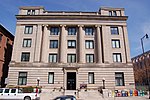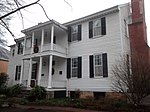The State Archives of North Carolina, officially the North Carolina Division of Archives and Records, is a division of North Carolina state government responsible for collecting, preserving, and providing public access to historically significant archival materials relating to North Carolina, and responsible for providing guidance on the preservation and management of public government records to state, county, city and state university officials. First founded as the North Carolina Historical Commission in 1903, the State Archives has undergone multiple changes in organization, title, and relation to other state agencies. Since May 2012, it has been known as the Division of Archives and Records within the North Carolina Department of Natural & Cultural Resources' Office of Archives and History.The State Archives includes four sections: Collection Services, Government Records, Digital Services, and Special Collections. The Outer Banks History Center (Manteo, N.C.), Western Regional Archives (Asheville, N.C.), and the main site at 109 East Jones Street in Raleigh account for the Archives' three locations open to the public. The State Archives' Government Records Section is responsible for administering records management services to state government agencies, local government agencies, and state-supported institutions of higher education in North Carolina, in accordance with its legislative mandates in General Statutes 121 and 132. As part of its records management program, the Government Records Section is responsible for managing the State Records Center.
The State Archives houses over 50,000 linear feet of materials documenting North Carolina history, including government records and non-government materials. Government materials include records from state agencies, counties, and limited municipal records. Special collection materials (non-government materials) include individual and family papers (including extensive military collections), organizational records, records of defunct North Carolina educational institutions, and audio-visual collections. The State Archives currently collects government records in all formats, including born-digital materials ranging from documents, photographs, and videos to web archives and social media archives. It collaborates with the State Library of North Carolina to manage the North Carolina Digital Repository, which provides long-term archival preservation for born-digital and digitized government and non-government records and materials.









